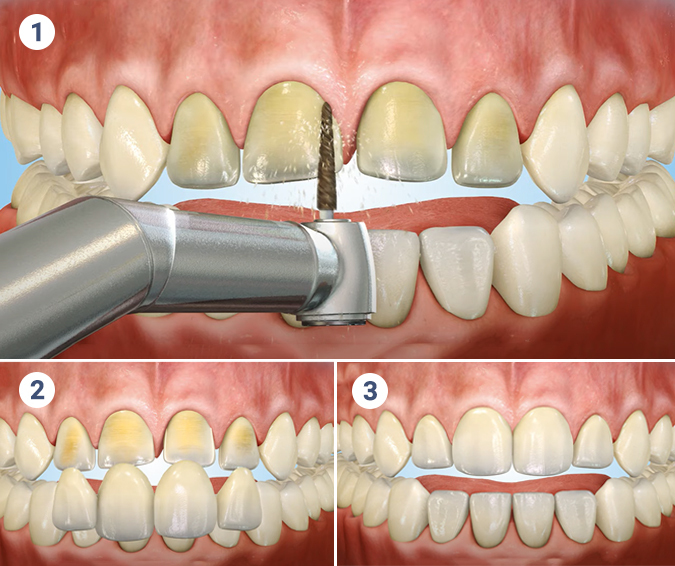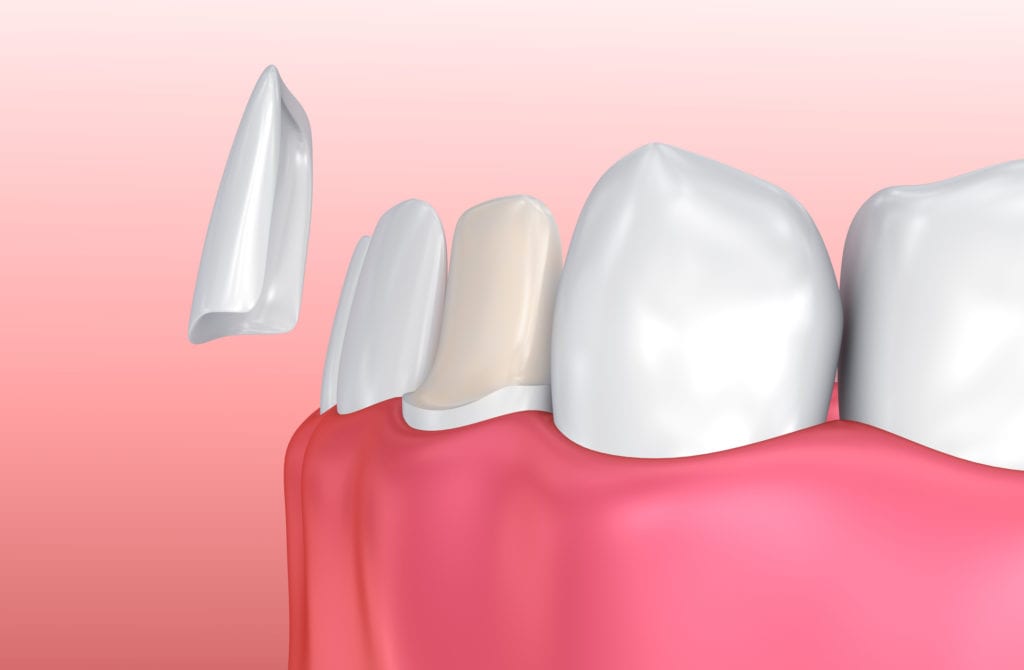The Total Overview of Veneers: Types, Utilizes, and Their Influence on Your Smile
Veneers act as a preferred solution for people seeking to enhance their dental appearances. These custom-crafted coverings can successfully mask imperfections such as discoloration and spaces. With two main types available, porcelain and composite resin, each offers distinct advantages and restrictions. The effect of veneers expands beyond mere appearance, influencing self-confidence and social communications. Recognizing their types and advantages is necessary. What might this suggest for one's general lifestyle?
Understanding Veneers: What They Are and How They Work
Veneers are slim shells, generally made from porcelain or composite material, that are custom-crafted to fit over the front surface of teeth. They serve both visual and practical functions, giving a solution for various dental blemishes such as discoloration, voids, and minor imbalances. By sticking to the tooth enamel, veneers produce a natural appearance while enhancing the shape and color of the teeth.
The process generally involves a first examination, where a dental professional examines the individual's requirements and talks about desired end results - Porcelain Veneers. Following this, a minimal quantity of enamel might be gotten rid of to accommodate the veneer. Perceptions of the teeth are then taken to assure a specific fit. As soon as fabricated, the veneers are adhered safely to the teeth utilizing an unique oral adhesive. This procedure not just improves the smile's appearance but also assists shield the underlying teeth from further damages, making veneers a prominent choice for several seeking a smile transformation
Sorts of Veneers: Porcelain vs. Compound Resin
The distinction between porcelain and composite resin veneers hinges on their product make-up and features. Each kind uses differing degrees of durability, expense, and sturdiness, affecting patients' choices based on their private demands. Comprehending these distinctions is crucial for making an informed choice relating to dental enhancements.
Material Distinctions Discussed
While both porcelain and composite resin veneers offer the exact same cosmetic function, they vary substantially in material buildings, sturdiness, and aesthetic results. Porcelain veneers are crafted from a ceramic material that simulates the all-natural translucence of teeth, supplying a natural appearance. Their smooth surface area is resistant to staining, making them an enticing option for those looking for a lasting aesthetic. On the other hand, composite material veneers are made from a tooth-colored plastic product, offering flexibility and convenience of application. Nonetheless, they might not accomplish the same degree of brightness or clarity as porcelain. In addition, composite veneers can be extra conveniently shaped and fixed, making them a more adaptable choice in certain oral situations. Each type offers one-of-a-kind benefits tailored to specific preferences.
Longevity and Durability
Longevity and longevity are substantial factors when contrasting porcelain and composite resin veneers. Porcelain veneers are known for their strength, usually enduring 10 to 15 years with appropriate care. Their durability against cracking and staining makes them a popular option for people looking for long-term outcomes. In comparison, composite resin veneers generally have a shorter life-span, averaging 5 to 7 years. While they can be repaired extra conveniently if damaged, they are more susceptible to put on and discoloration gradually. The option between these materials often relies on the individual's way of living, aesthetic objectives, and maintenance preferences. Ultimately, understanding the differences in durability and toughness can assist patients in picking the veneer type that ideal fits their needs.
Cost Contrast Insights
Expense is an important consideration when choosing between porcelain and composite material veneers. Porcelain veneers generally vary from $800 to $2,500 per tooth, reflecting their durability, aesthetic charm, and resistance to staining. These veneers require a much more substantial procedure and specialized laboratory job, adding to their greater cost. In contrast, composite material veneers are typically much more budget-friendly, costing between $250 and $1,500 per tooth. They can be used in a single visit, which minimizes labor expenses. Nonetheless, composite veneers might require much more constant substitutes, potentially raising long-term expenses. Ultimately, the selection between porcelain and composite resin veneers depends upon individual budget plans and desired results, stabilizing first prices versus longevity and visual outcomes.
The Benefits of Choosing Veneers for Your Smile
Selecting veneers supplies significant benefits for those looking for a boosted smile. Their enhanced aesthetic appeal can change the look of teeth, while their stain-resistant properties assure a lasting illumination - What Are Veneers. This combination makes veneers a prominent choice for individuals wanting to accomplish a flawless smile
Enhanced Visual Allure
When individuals look for to enhance their smiles, veneers frequently become a favored service as a result of their transformative aesthetic advantages. These slim shells, usually made of porcelain or composite material, can efficiently hide imperfections such as chips, spaces, and misalignment. By resembling the natural appearance of teeth, veneers supply a smooth, radiant smile. Their personalized nature enables a customized technique, allowing individuals to pick tones and shapes that ideal fit their facial attributes. In addition, veneers can create an uniform appearance, boosting general face proportion. This aesthetic enhancement not only increases confidence yet can additionally positively affect individual relationships and social interactions, making veneers a preferred selection for those wanting to attain a brighter, much more eye-catching smile.
Discolor Resistance Benefits
Veneers not just improve aesthetic appeal however likewise use considerable stain resistance, making them an attractive choice for individuals worried about keeping a bright smile. Composed of sturdy this content products such as porcelain or composite material, veneers are less permeable than all-natural teeth, which aids avoid the absorption of spots from common offenders like coffee, tea, and red a glass of wine. This integral tarnish resistance allows people to appreciate their favored drinks without stressing over discoloration. Veneers Teeth. Additionally, the smooth surface of veneers makes them less complicated to clean, further boosting their longevity and maintaining their excellent look. Therefore, veneers supply a sensible remedy for those seeking both beauty and capability have a peek at this site in their dental care
The Refine of Getting Veneers: What to Expect

The process of obtaining veneers may appear challenging, comprehending the steps included can alleviate concerns. A consultation with a dental professional is required to establish if veneers are the ideal service for the person's oral issues. During this consultation, the dental professional will discuss desired end results and take impressions of the teeth.
Next, a 2nd visit is scheduled for tooth prep work, where a small amount of enamel is generally removed to fit the veneers. Temporary veneers may be positioned while the custom ones are crafted in a dental lab, which usually takes a couple of weeks.
Once ready, the dental practitioner will put the veneers, guaranteeing correct fit and shade before bonding them to the teeth using an unique adhesive. After last modifications, the dental expert will provide guidance on care. Recognizing these steps can assist people feel more comfy and notified throughout the veneer procedure.
Maintenance and Take Care Of Your Veneers
Preserving veneers needs consistent like ensure their durability and look. Correct oral why not check here hygiene is essential; brushing two times daily with a non-abrasive toothpaste and flossing frequently aid prevent plaque buildup around the veneers. In addition, regular dental examinations are crucial for keeping an eye on the problem of the veneers and attending to any possible problems early.
When biting to protect against damages, people should avoid tough foods and too much pressure. It's additionally advisable to limit consumption of staining materials, such as coffee, tea, and red a glass of wine, as these can influence the veneers' color in time.

Transforming Your Smile: Real-Life Influence of Veneers
A radiant smile can considerably boost one's confidence and overall look. For numerous people, veneers offer as a transformative remedy, efficiently resolving different oral concerns such as staining, gaps, and imbalance. These thin coverings, personalized to fit over the front of the teeth, can develop a harmonious and aesthetically pleasing smile.
Real-life situations show the profound impact veneers can have. Clients commonly report a prompt boost in self-worth and social interactions following their procedure. The newly found self-confidence can result in even more possibilities in individual and expert life, as people really feel more inclined to involve and share themselves.
Furthermore, the psychological benefits expand beyond mere look; lots of experience improved psychological well-being as they welcome their smiles. As a result, veneers not just improve physical attributes yet additionally contribute substantially to overall lifestyle, emphasizing their value in aesthetic dentistry.
Regularly Asked Concerns
Exactly How Lengthy Do Veneers Normally Last Prior To Needing Substitute?
Veneers generally last between 10 to 15 years prior to calling for substitute. Factors such as oral hygiene, oral routines, and the kind of product made use of can influence their longevity and overall toughness. Normal dental check-ups are a good idea.
Can Veneers Be Gotten Rid Of, and if So, Just how?
Yes, veneers can be removed. A dental expert generally uses customized devices to thoroughly detach them from the teeth, guaranteeing marginal damages to the underlying enamel, typically followed by necessary changes or reconstructions for ideal visual appeals.
Are Veneers Suitable for Everyone's Dental Condition?

Will Obtaining Veneers Hurt or Require Anesthesia?
Getting veneers typically entails minimal discomfort, and many clients receive neighborhood anesthesia to ensure a pain-free experience. Level of sensitivity might happen briefly later, yet a lot of locate the process bearable and are pleased with the results.
Exactly How Do Veneers Affect Tooth Sensitivity After Positioning?
Veneers can briefly enhance tooth level of sensitivity because of the removal of enamel and the bonding procedure. A lot of people experience a decrease in sensitivity in time as the teeth readjust to the brand-new veneers.
Veneers are slim coverings, typically made from porcelain or composite resin, that are custom-crafted to fit over the front surface of teeth. Porcelain veneers are crafted from a ceramic material that simulates the natural translucence of teeth, offering a lifelike look. Porcelain veneers commonly vary from $800 to $2,500 per tooth, showing their longevity, aesthetic charm, and resistance to staining. In contrast, composite material veneers are typically more inexpensive, costing in between $250 and $1,500 per tooth. Made up of sturdy products such as porcelain or composite material, veneers are less porous than all-natural teeth, which aids stop the absorption of discolorations from common wrongdoers like coffee, tea, and red wine.